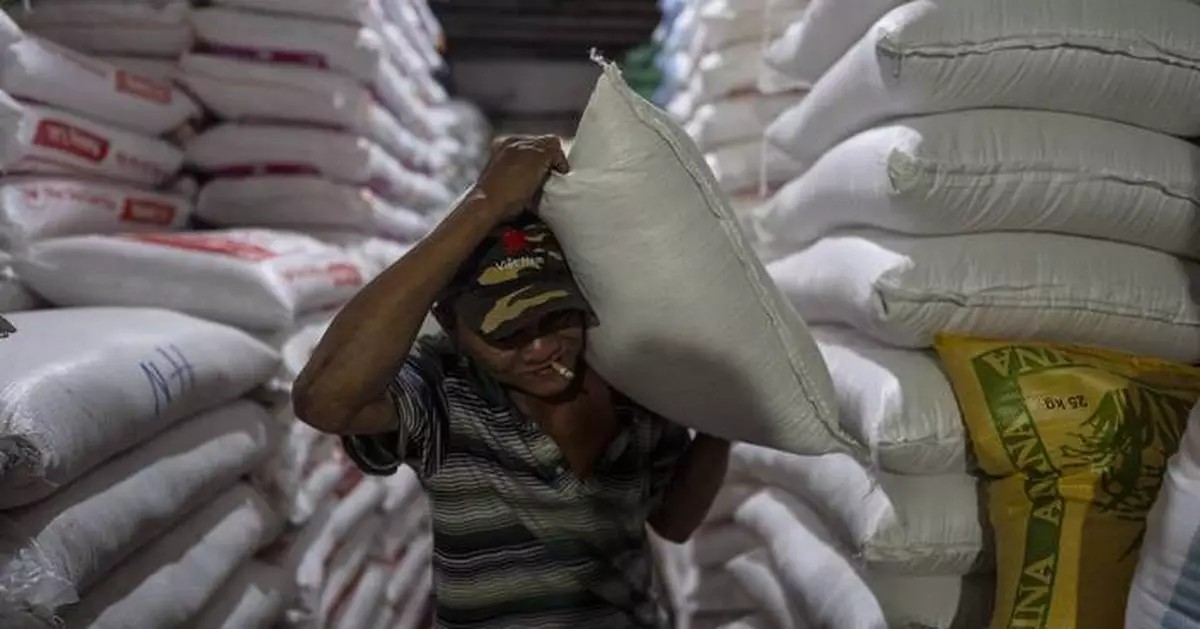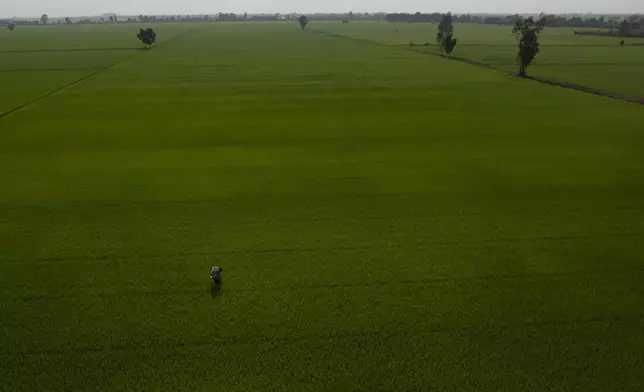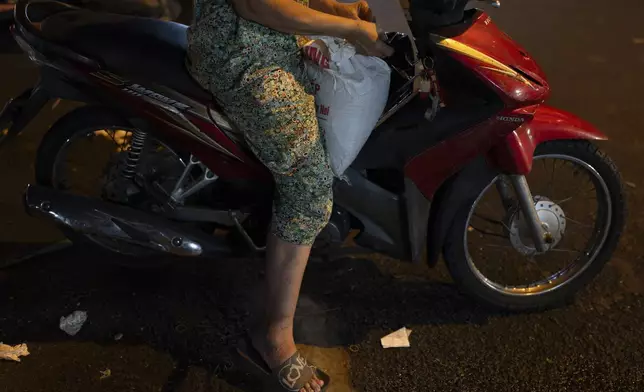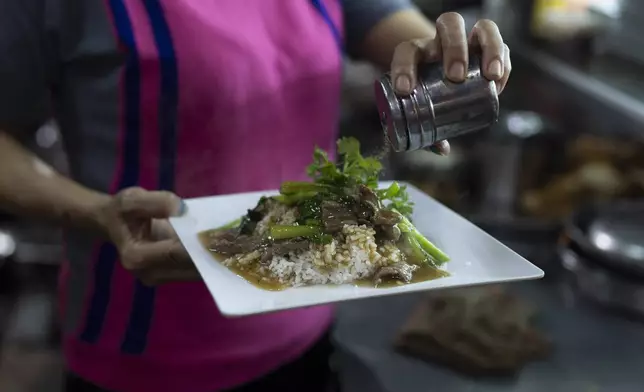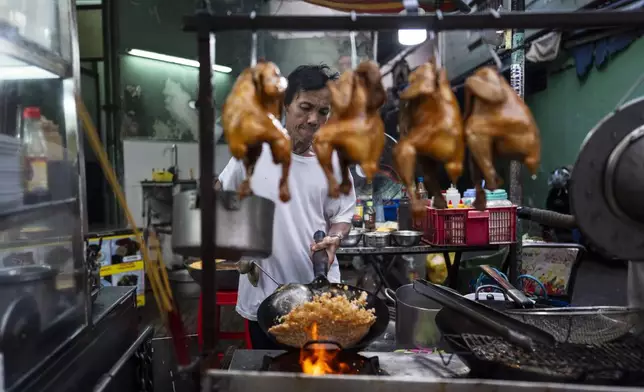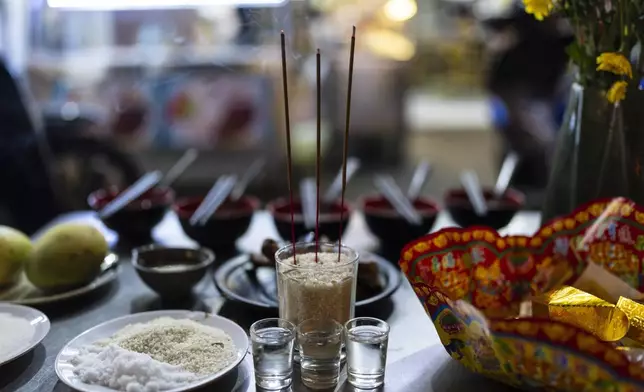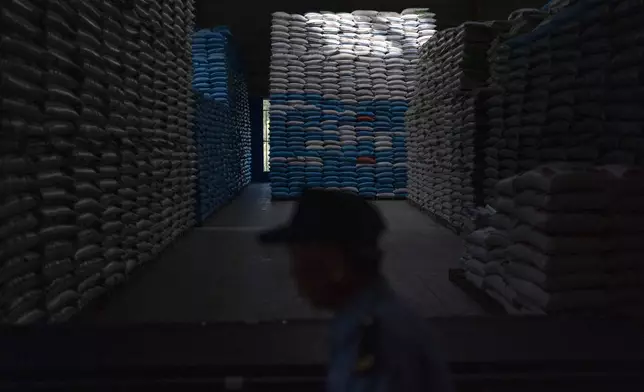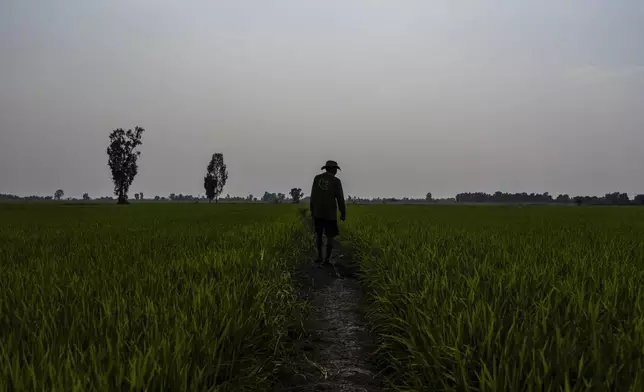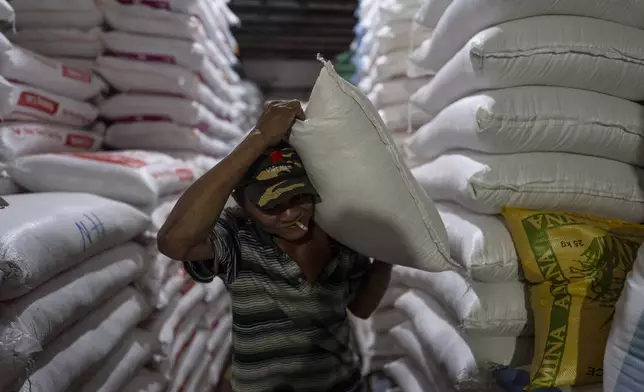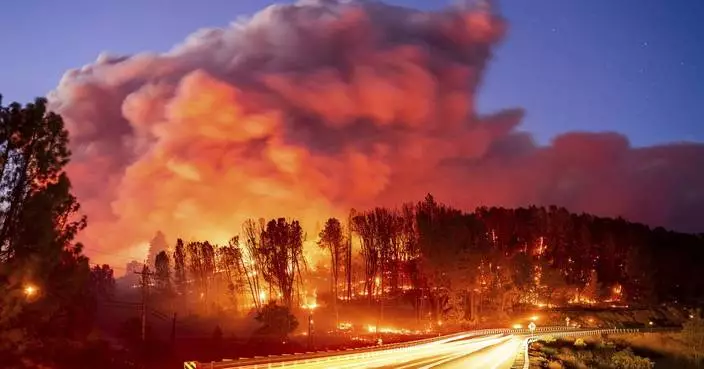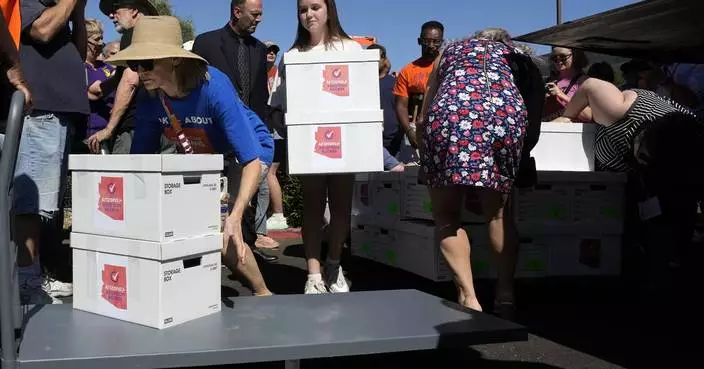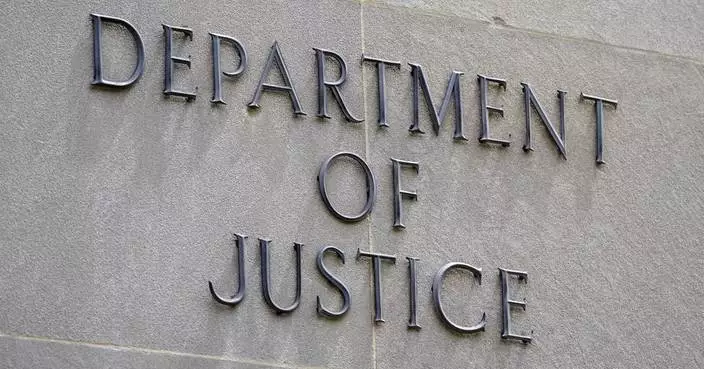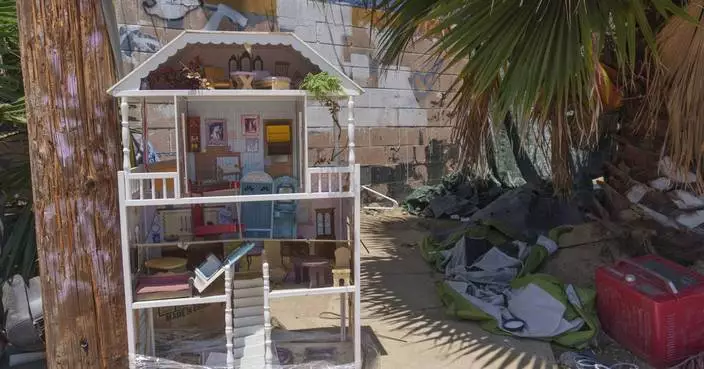LONG AN, Vietnam (AP) — There is one thing that distinguishes 60-year-old Vo Van Van’s rice fields from a mosaic of thousands of other emerald fields across Long An province in southern Vietnam’s Mekong Delta: It isn’t entirely flooded.
That and the giant drone, its wingspan similar to that of an eagle, chuffing high above as it rains organic fertilizer onto the knee-high rice seedlings billowing below.
Using less water and using a drone to fertilize are new techniques that Van is trying and Vietnam hopes will help solve a paradox at the heart of growing rice: The finicky crop isn’t just vulnerable to climate change but also contributes uniquely to it.
Rice must be grown separately from other crops and seedlings have to be individually planted in flooded fields; backbreaking, dirty work requiring a lot of labor and water that generates a lot of methane, a potent planet-warming gas that can trap more than 80-times more heat in the atmosphere in the short term than carbon dioxide.
It's a problem unique to growing rice, as inundated fields stop oxygen from entering the soil, creating the conditions for methane-producing bacteria. Rice paddies contribute 8% of all human-made methane in the atmosphere, according to a 2023 Food and Agriculture Organization report.
Vietnam is the world's third-largest rice exporter, and the staple importance to Vietnamese culture is palpable in the Mekong Delta. The fertile patchwork of green fields crisscrossed by silvery waterways has helped stave off famine since the Vietnam War ended in 1975. Rice isn't just the mainstay of most meals, it is considered a gift from the gods and continues to be venerated.
It is molded into noodles and sheets and fermented into wine. In busy markets, motorcyclists lug 10-kilogram (22-pound) bags to their homes. Barges haul mountains of the grain up and down the Mekong River. Rice kernels are then dried and hulled by machines before they're packed for sale in factories, lined from floor to ceiling with sacks of rice.
Van has been working with one of Vietnam’s largest rice exporters, the Loc Troi Group, for the past two years and is using a different method of irrigation known as alternate wetting and drying, or AWD. This requires less water than traditional farming since his paddy fields aren’t continuously submerged. They also produce less methane.
Using the drone to fertilize the crops saves on labor costs. With climate shocks pushing a migration to cities, Van said that it's harder to find people to work the farms. It also ensures precise amounts of fertilizers are applied. Too much fertilizer causes the soil to release Earth-warming nitrogen gases.
Once crops are harvested, Van no longer burns the rice stubble — a major cause of air pollution in Vietnam and in its neighbors, as well as Thailand and India. Instead, it's collected by the Loc Troi Group for sale to other companies that use it as livestock feed and for growing straw mushrooms, a popular addition to stir-fries.
Van benefits in various ways. His costs are down while his farm yield is the same. Using organic fertilizer enables him to sell to European markets where customers are willing to pay a premium for organic rice. Best of all, he has time to tend to his own garden.
“I am growing jackfruit and coconut,” he said.
Loc Troi Group CEO Nguyen Duy Thuan said that those methods enable farmers to use 40% less rice seed and 30% less water. Costs for pesticides, fertilizer and labor also are lower. Thuan said Loc Troi — which exports to more than 40 countries including in Europe, Africa, the United States and Japan — is working with farmers to expand acreage using its methods from the current 100 hectares to 300,000 hectares.
That's a long way from Vietnam’s own target of growing “high quality, low emission rice” on 1 million hectares of farmland, an area more than six times the size of London, by 2030. Vietnamese officials estimate that would reduce production costs by a fifth and increase farmers' profits by more than $600 million, according to the state media outlet Vietnam News.
Vietnam recognized early on that it had to reconfigure its rice sector. It was the largest rice exporter, ahead of both India and Thailand, to sign a 2021 pledge to reduce methane emissions at the annual United Nations climate summit in Glasgow, Scotland.
Each year, the industry suffers losses of over $400 million, according to recent research by Vietnam’s Water Resources Science Institute. This is worrying, not just for the country but for the world.
The Mekong Delta, where 90% of Vietnam's exported rice is farmed, is one of the world's regions most vulnerable to climate change. A U.N. climate change report in 2022 warned of heavier flooding in the wet season and droughts in the dry season. Scores of dams built upstream in China and Laos have reduced the river's flow and the amount of sediment that it carries downriver to the sea. The sea level is rising and turning the river's lower reaches salty. And unsustainable levels of groundwater pumping and sand mining for construction have added to the problems.
Changing centuries-old forms of rice farming is expensive, and even though methane is a more potent cause of global warming than carbon dioxide, it only receives 2% of climate financing, Ajay Banga, the World Bank's president, told the U.N. climate summit in Dubai last year.
Combating methane emissions is the “one rare, clear area” where low-cost, effective and replicable solutions exist, Banga said. The World Bank is supporting Vietnam's efforts and has begun helping the Indonesian government to expand climate resilient farming as a part of more than a dozen projects to reduce methane worldwide.
The hope is that more countries will follow, though there is no “one-size-fits-all,” said Lewis H. Ziska, a professor of environmental health sciences at Columbia University. “The one commonality is that water is needed,” he said, adding that different methods of planting and irrigation can help manage water better.
Growing more genetically diverse rice varieties would also help because some are more resilient to excess heat or require less water, while others might even emit less methane, he said.
Nguyen Van Nhut, director of the rice export company Hoang Minh Nhat, said its suppliers are using varieties of rice that can thrive even when the water is briny and the heat is extreme.
Now, the business is adapting to the unseasonal rains that make it harder to dry the rice, adding to risks from mold or insect damage. Typically, rice is dried in the sun immediately after harvest, but Nhut said his company has drying facilities in their packaging factory and also will install machinery to dry the grains closer to the fields.
“We don’t know which month is the rainy season, like we did before,” he said.
The Associated Press’ climate and environmental coverage receives financial support from multiple private foundations. AP is solely responsible for all content. Find AP’s standards for working with philanthropies, a list of supporters and funded coverage areas at AP.org.

A farmer sprays fertilizer onto the rice fields in Long An province in southern Vietnam's Mekong Delta, Tuesday, Jan. 23, 2024. Using less water and using a drone to fertilize are new techniques that Van is trying and Vietnam hopes will help solve a paradox at the heart of growing rice: The finicky crop isn't just vulnerable to climate change but also contributes uniquely to it. (AP Photo/Jae C. Hong)

A woman sits on a scooter with a bag of rice purchased from a local market in Ho Chi Minh City, Vietnam, Wednesday, Jan. 24, 2024. Vietnam is the world's third largest rice exporter, and the staple importance to Vietnamese culture is palpable in the Mekong Delta. (AP Photo/Jae C. Hong)
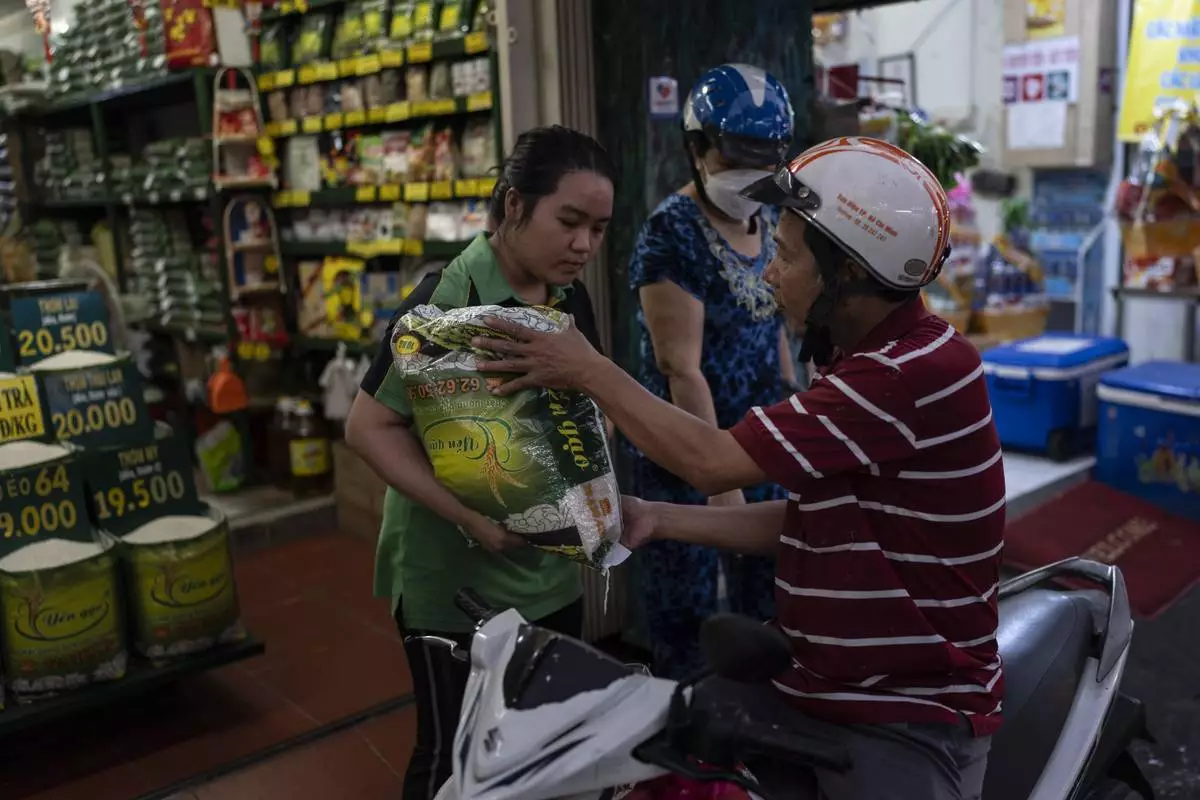
A rice shop employee hands a bag of rice to a customer sitting on a scooter in Ho Chi Minh City, Vietnam, on Wednesday, Jan. 24, 2024. Vietnam is the world's third largest rice exporter, and the staple importance to Vietnamese culture is palpable in the Mekong Delta. (AP Photo/Jae C. Hong)
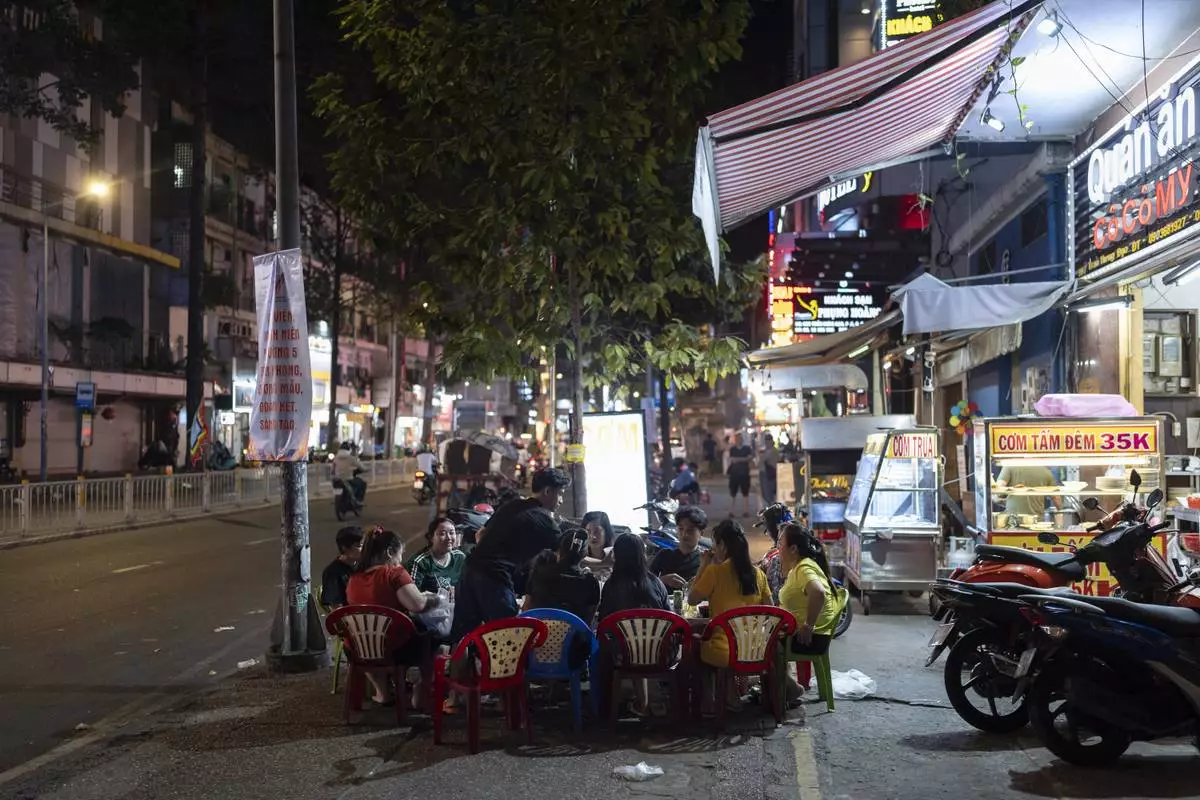
A group of people fills the sidewalk outside a restaurant as they share dishes made from rice in Ho Chi Minh City, Vietnam, on Saturday, Jan. 27, 2024. Vietnam is the world's third largest rice exporter, and the staple importance to Vietnamese culture is palpable in the Mekong Delta. (AP Photo/Jae C. Hong)
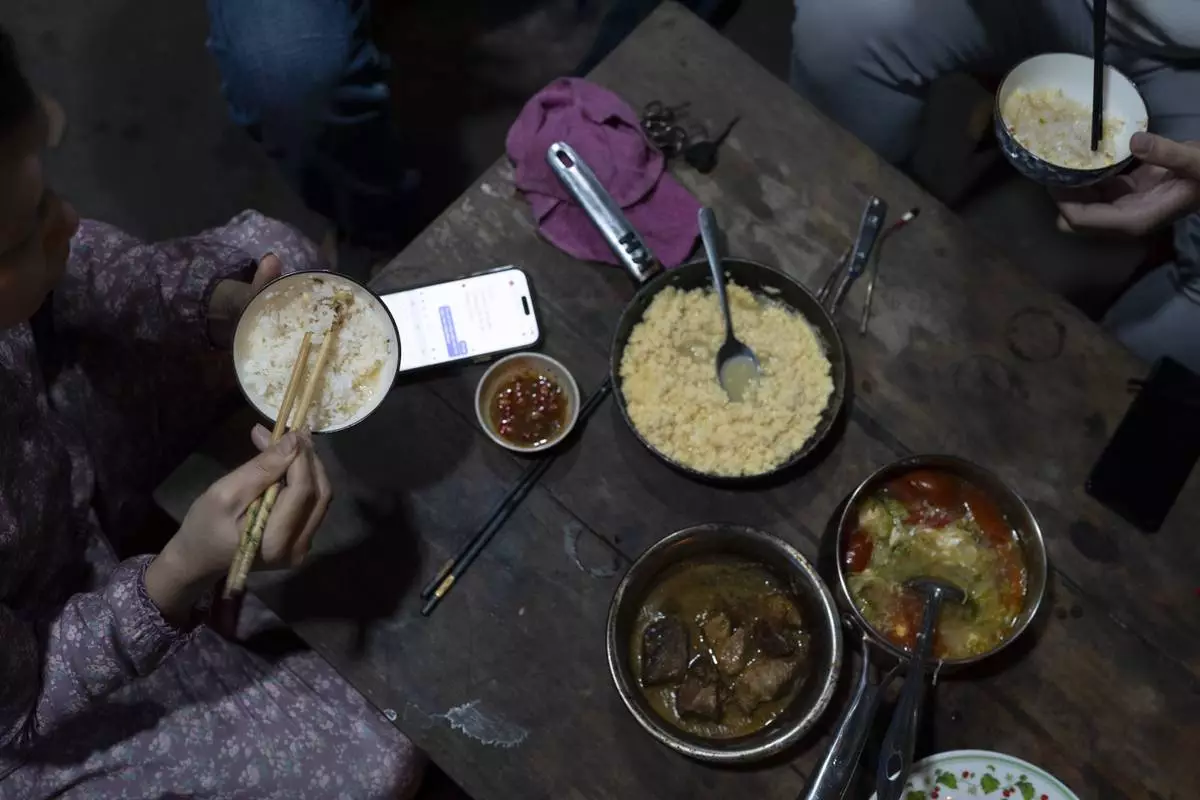
A family eats dinner outside their shop in Ho Chi Minh City, Vietnam, Wednesday, Jan. 24, 2024. Rice isn't just the mainstay of most meals, it is considered a gift from the gods and continues to be venerated. (AP Photo/Jae C. Hong)

A restaurant worker sprinkles crushed pepper over a rice dish in Ho Chi Minh City, Vietnam, Wednesday, Jan. 24, 2024. Rice isn't just the mainstay of most meals, it is considered a gift from the gods and continues to be venerated. (AP Photo/Jae C. Hong)

Restaurant owner Hien Ky prepares fried rice in Ho Chi Minh City, Vietnam, Saturday, Jan. 27, 2024. Vietnam is the world's third largest rice exporter, and the staple importance to Vietnamese culture is palpable in the Mekong Delta. (AP Photo/Jae C. Hong)

Incense, placed in a cup of rice, burns on an altar outside a restaurant to seek prosperity in Ho Chi Minh City, Vietnam, Saturday, Jan. 27, 2024. Rice isn't just the mainstay of most meals, it is considered a gift from the gods and continues to be venerated. (AP Photo/Jae C. Hong)

A security guard walks across a warehouse packed with bags of rice packaged for shipment at Hoang Minh Nhat, a rice export company in Can Tho, Vietnam, Friday, Jan. 26, 2024. The Mekong Delta, where 90% of Vietnam's exported rice is farmed, is one of the world's regions most vulnerable to climate change. (AP Photo/Jae C. Hong)
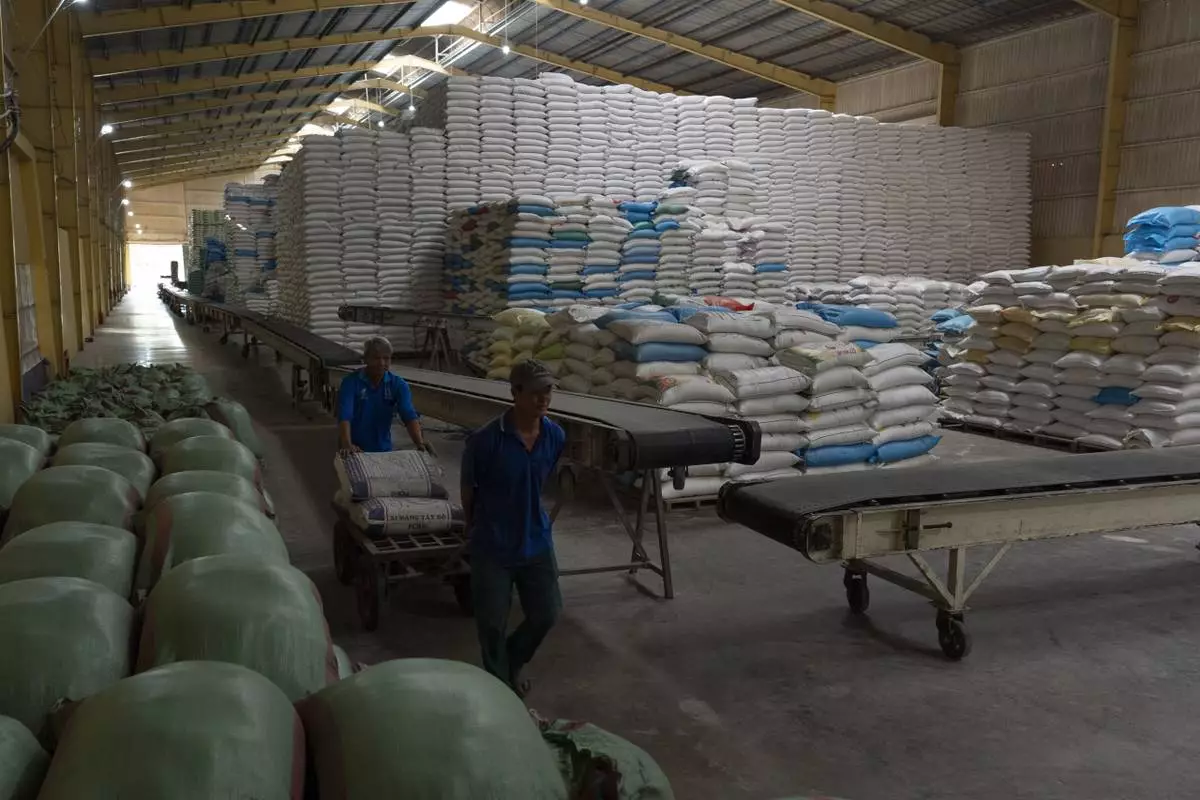
Two employees work in a warehouse packed with bags of rice packaged for shipment at Hoang Minh Nhat, a rice export company in Can Tho, Vietnam, Friday, Jan. 26, 2024. The Mekong Delta, where 90% of Vietnam's exported rice is farmed, is one of the world's regions most vulnerable to climate change. (AP Photo/Jae C. Hong)

Rice is processed at Hoang Minh Nhat, a rice export company in Can Tho, Vietnam, Friday, Jan. 26, 2024. The Mekong Delta, where 90% of Vietnam's exported rice is farmed, is one of the world's regions most vulnerable to climate change. (AP Photo/Jae C. Hong)
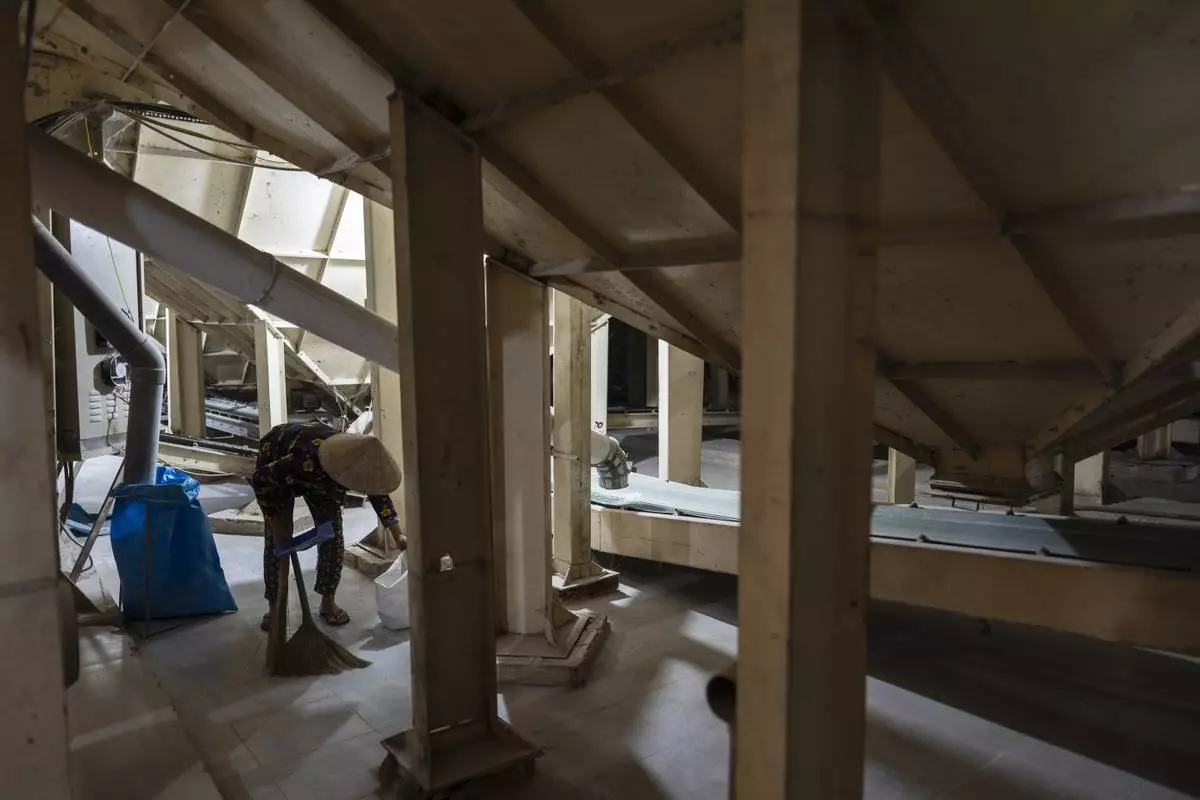
A worker sweeps the floor beneath rice processors in a warehouse at Hoang Minh Nhat, a rice export company in Can Tho, Vietnam, Friday, Jan. 26, 2024. The Mekong Delta, where 90% of Vietnam's exported rice is farmed, is one of the world's regions most vulnerable to climate change. (AP Photo/Jae C. Hong)
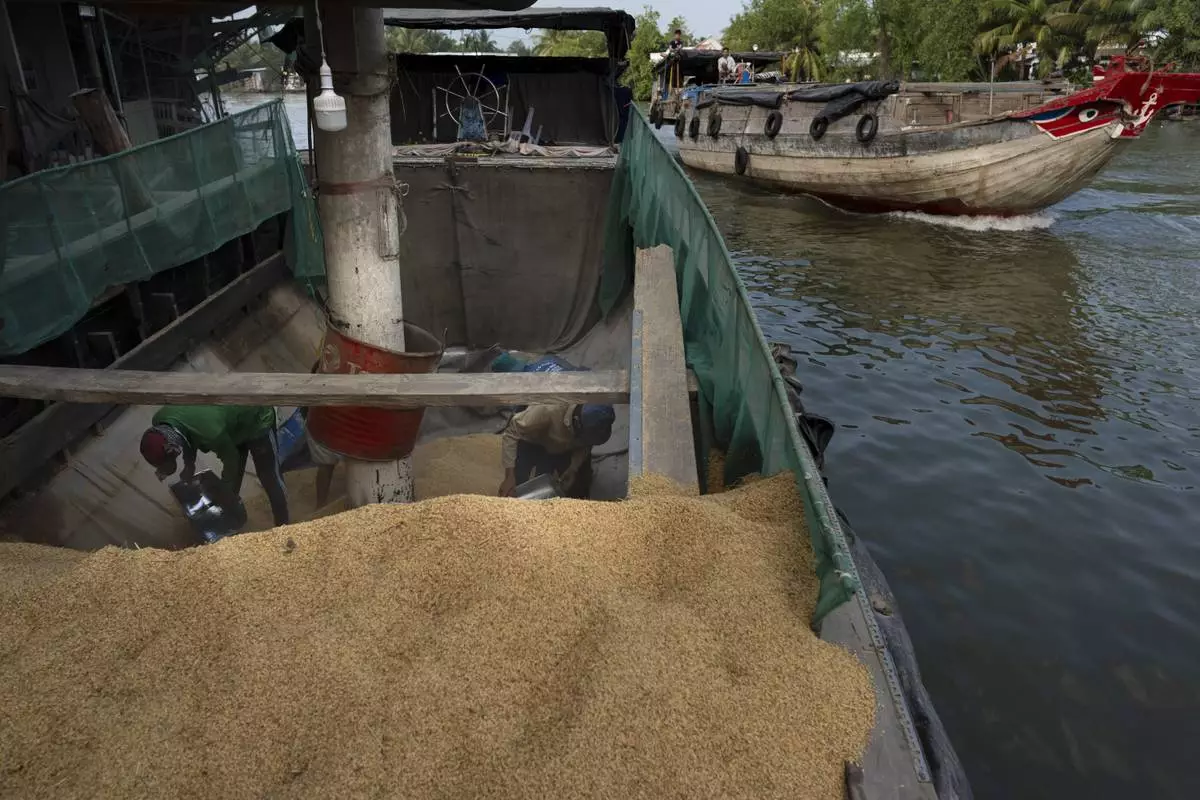
Workers scoop paddy rice into the mouth of a vacuum tube on a boat for processing at Hoang Minh Nhat, a rice export company in Can Tho, Vietnam, on Friday, Jan. 26, 2024. The Mekong Delta, where 90% of Vietnam's exported rice is farmed, is one of the world's regions most vulnerable to climate change. (AP Photo/Jae C. Hong)
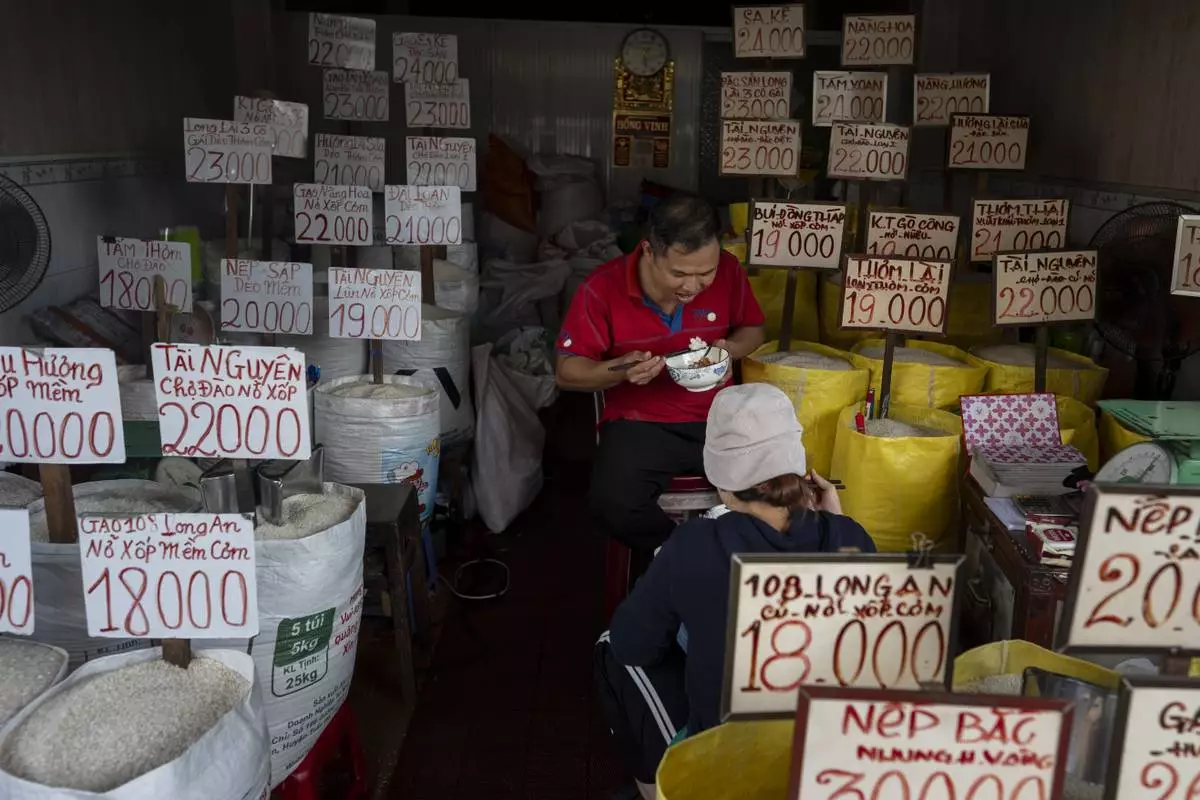
Rice shop owner Vo Tan Nha and his wife eat bowls of rice for lunch in their shop in Ho Chi Minh City, Vietnam, Tuesday, Jan. 30, 2024. Rice isn't just the mainstay of most meals, it is considered a gift from the gods and continues to be venerated. (AP Photo/Jae C. Hong)
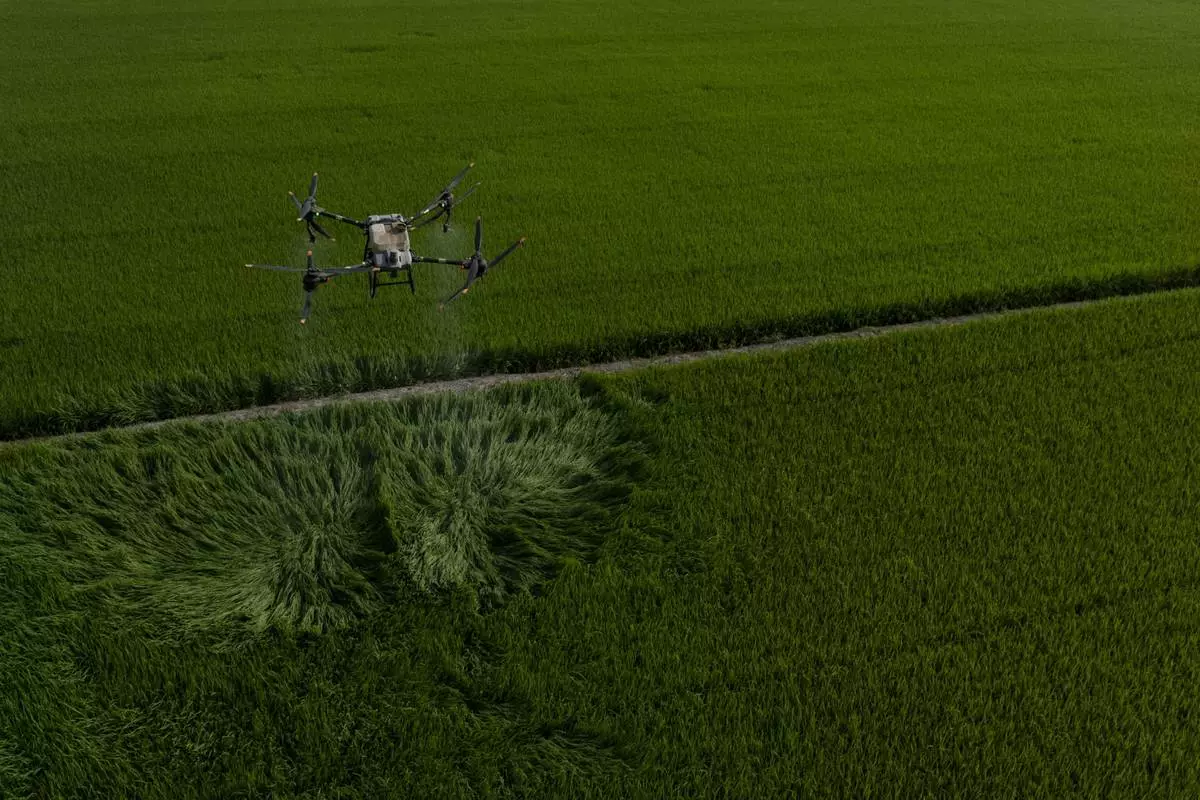
A large drone carrying fertilizer flies over Vo Van Van's rice fields in Long An province in southern Vietnam's Mekong Delta, Tuesday, Jan. 23, 2024. Using less water and using a drone to fertilize are new techniques that Van is trying and Vietnam hopes will help solve a paradox at the heart of growing rice: The finicky crop isn't just vulnerable to climate change but also contributes uniquely to it. (AP Photo/Jae C. Hong)
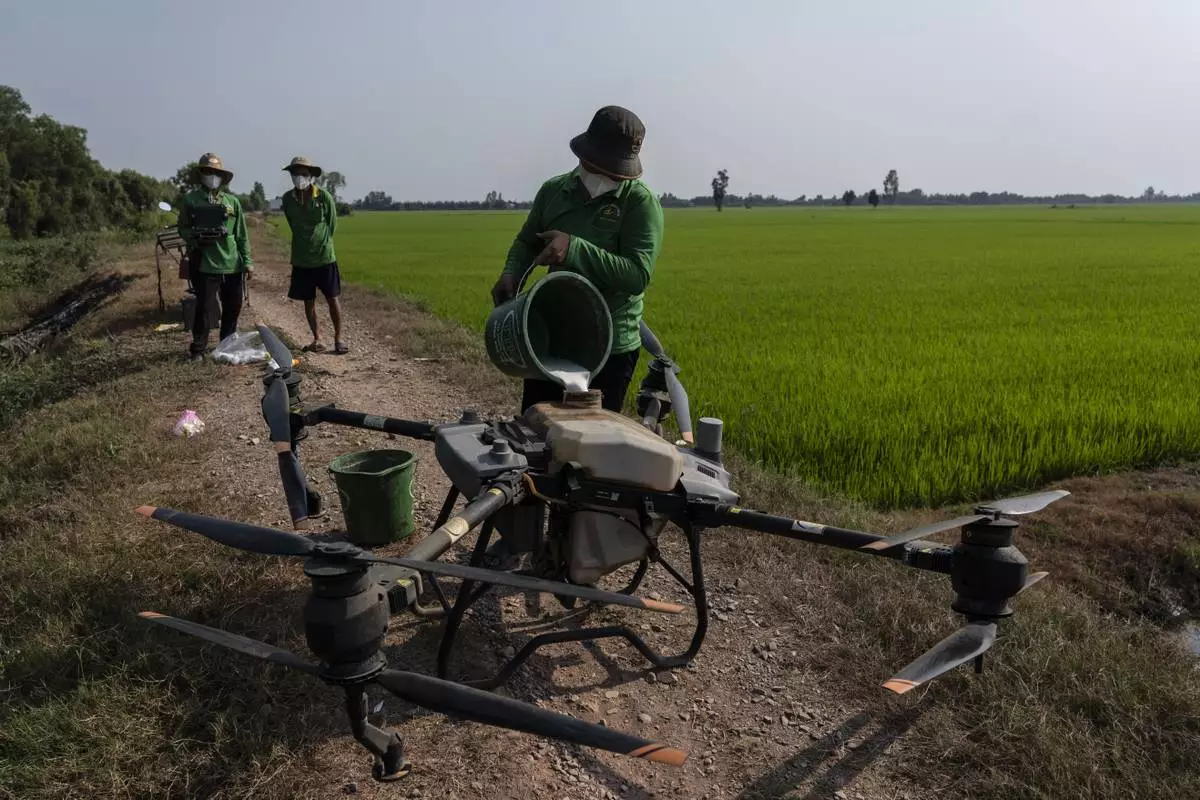
A worker loads fertilizer into a tank attached to a large drone, preparing to spray it over Vo Van Van's rice fields in Long An province in southern Vietnam's Mekong Delta, Tuesday, Jan. 23, 2024. Using less water and using a drone to fertilize are new techniques that Van is trying and Vietnam hopes will help solve a paradox at the heart of growing rice: The finicky crop isn't just vulnerable to climate change but also contributes uniquely to it. (AP Photo/Jae C. Hong)

A worker surveys Vo Van Van's rice fields after spraying fertilizer over the fields using a drone in Long An province in southern Vietnam's Mekong Delta, Tuesday, Jan. 23, 2024. Using less water and using a drone to fertilize are new techniques that Van is trying and Vietnam hopes will help solve a paradox at the heart of growing rice: The finicky crop isn't just vulnerable to climate change but also contributes uniquely to it. (AP Photo/Jae C. Hong)

A worker carries a bag of rice at a warehouse in Ho Chi Minh City, Vietnam, Tuesday, Jan. 30, 2024. Vietnam is the world's third largest rice exporter, and the staple importance to Vietnamese culture is palpable in the Mekong Delta. (AP Photo/Jae C. Hong)


